Pro-Kremlin media amplify Serbian president’s false anti-EU statement regarding medical supply…
President’s claim that EU banned exporting
Pro-Kremlin media amplify Serbian president’s false anti-EU statement regarding medical supply…
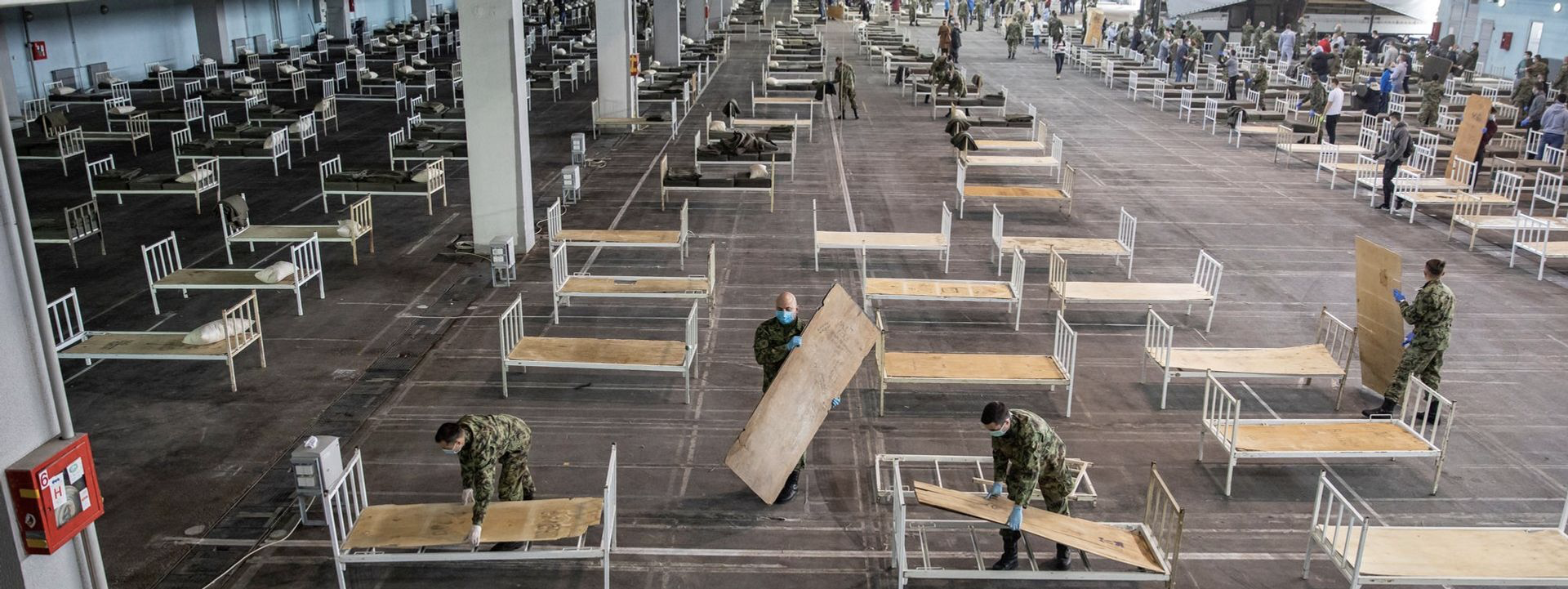
President’s claim that EU banned exporting masks to non-EU countries was false, but pro-Kremlin media promoted it anyway
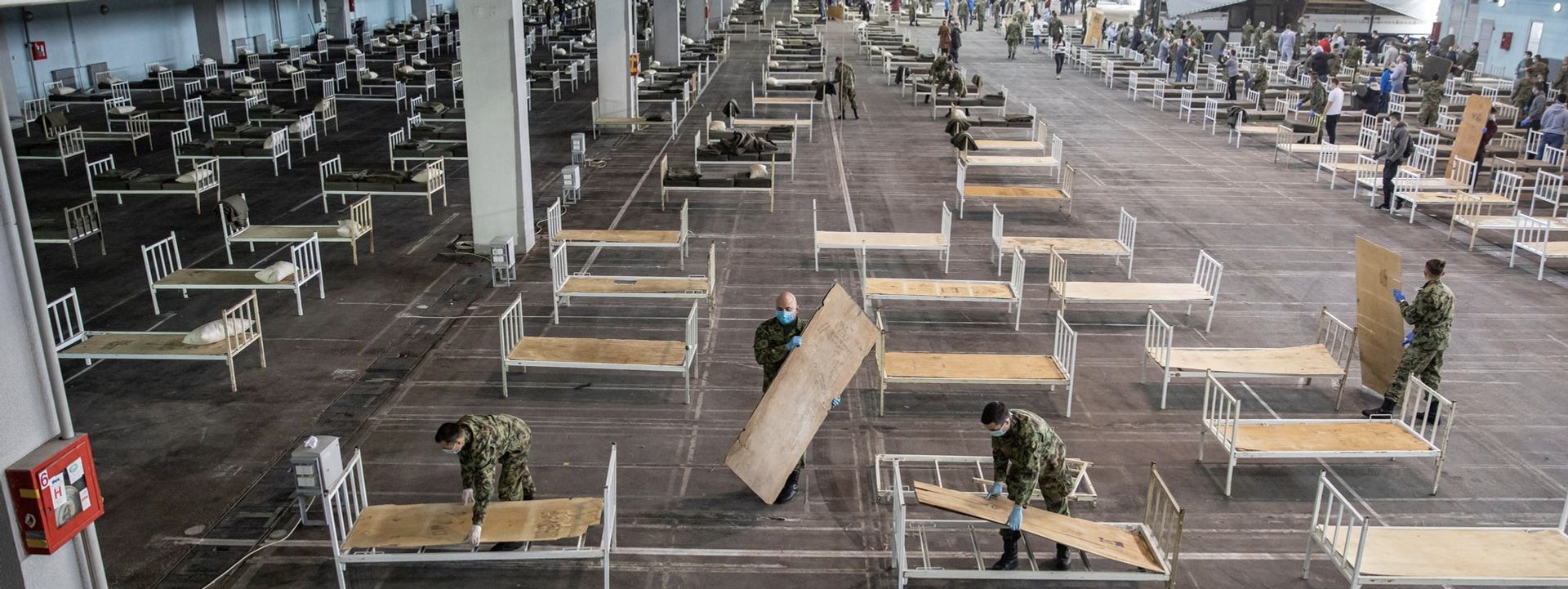
As the number of confirmed COVID-19 cases mounted in Serbia, President Aleksandar Vučić unfairly accused the European Union of banning the export of medical equipment to countries outside the EU. President Vučić’s anti-EU claim was unsubstantiated, but pro-Kremlin outlets in Russia nonetheless used it to double down on their anti-EU propaganda.
Before asking China and Russia for help, Serbia’s President denounced the European Union for banning the export of masks. “As of today, as you know, we cannot even import goods, according to the European Union’s decisions,” he said, adding, “European solidarity does not exist. That was a fairytale on paper.”
In reality, the European Commission, through a non-legislative act, delegated the authorization to export masks to non-EU countries; the export of face masks to third countries was never banned on the EU-level. Nevertheless, pro-Kremlin outlets used Vučić’s statement to cast doubt on Serbia’s aspirations to ascend to the EU and presented Russia as a more reliable partner that was committed — unlike the EU — to sending much-needed humanitarian aid to Serbia.
Although Serbia is a candidate country for EU membership, it maintains close ties with Russia, which has a direct interest in preventing Serbia from joining Euro-Atlantic institutions. To that end, the Kremlin employs a number of soft power levers to achieve this goal, and the COVID-19 pandemic presented Russia with an opportunity to advance its interests. On April 3, 2020, Moscow sent medical personnel and equipment to Serbia to help the country in its fight against the pandemic. While promoting this highly visible PR act through multiple channels, Kremlin actors also attempted to temper Serbia’s pro-EU ambitions by nurturing anti-EU narratives.
Pro-Kremlin outlets pick up the anti-EU statement
Pro-Kremlin media outlets amplified President Vučić’s claim about banning the export of medical masks to non-EU countries and — in light of the EU’s failure to show solidarity to Serbia — tried to depict Russia as Serbia’s savior. Ria Novosti published an article titled, “Thanks to the Russian people. What Serbia will not forgive Europe,” in which the author claimed that President Vučić initially turned to Brussels for aid, but that Brussels refused to provide Serbia with medical equipment. In an attempt to denigrate Serbia’s status of the official EU candidate country, the author then claimed that even the aspirations of EU membership did not help Belgrade secure much-needed help from the EU. As a result, Serbia had to ask for help from China and Russia, which readily sent medical supplies to Belgrade. The article claimed that even though the EU finally allocated some financial support to Serbia to battle COVID-19, Serbs ignored the belated EU assistance.
According to social media monitoring tool BuzzSumo, the article received approximately 1,600 engagements on Facebook, with an additional 815 engagements when it was republished on a site called Putin Today. Three other reprints of the article resulted in almost no engagement.
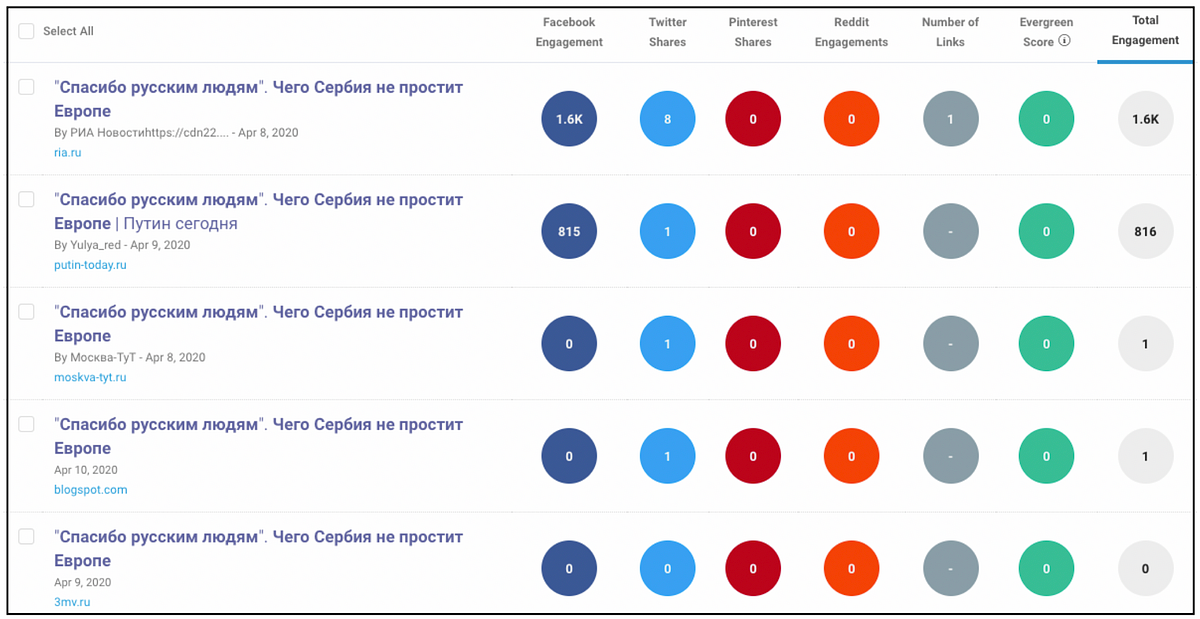
Another op-ed published by TASS posed a question in the headline asking whether receiving help from Russia and China amid the COVID-19 crisis had buried Serbia’s EU dreams. The author, Pavel Bushuev, reproached Germany, Serbia’s leading trading partner, for banning the sale of medical equipment to the country. He also criticized French President Emmanuel Macron for offering moral — but not humanitarian — support to Serbia, and praised Vladimir Putin for displaying solidarity and sending a humanitarian aid package to Serbia that constituted the highest per-capita Russian aid to any country since the start of the coronavirus pandemic. The author concluded that since Europeans and Americans had accepted Russian COVID-19 humanitarian aid earlier, Washington and Brussels had no basis to reproach Moscow for assisting Serbia.
A Nezavisimaya Gazeta article speculated that after the coronavirus crisis is over, the Serbian government could make the reasonable choice to refuse to join the European Union. The author of the article, Elena Ponomareva, suggested that the notion of Serbia’s European destiny crumbled as soon as Europe faced an unknown enemy in COVID-19: “the concepts of ‘solidarity’ and ‘mutual assistance’ have been shelved until future geopolitical games,” she wrote. Ponomareva also slammed NATO, arguing that Russian humanitarian assistance to Serbia was a proper move given that NATO is “brain dead” and the West is “morally bankrupt.”
Other Kremlin-funded outlets also reiterated the false claim that the EU had banned the export of medical equipment to non-EU countries. A broadcast by Russia’s Perviy Kanal stated that “coronavirus put an end to the notorious solidarity of the European Union,” as the case of Serbia supposedly showed. Sputnik Belarus claimed that Serbia’s President Vučić was outraged by the ban on the export of medicine and supplies from the EU, and had to turn to Chinese leader Xi Jinping for help. And in an interview with Politnavigator, Serbia-based Russian journalist Katarina Lane claimed that in the face of empty promises from the European Union, Serbs greeted Russian military doctors as heroes.
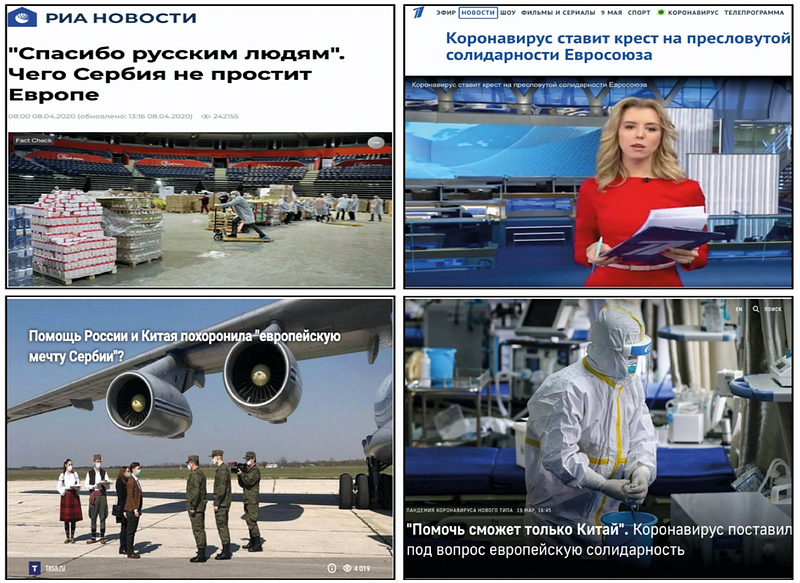
Expectation vs. reality in international aid to Serbia
The European Commission’s decision to defer to member states regarding the export of medical equipment to non-EU countries was not a ban on such exports, as Serbia’s President and pro-Kremlin media outlets claimed. Rather, the measure was enacted to allow member states the freedom to take “individual approaches affecting the circulation of such equipment within the single market as well as to third countries.” Commission President Ursula von der Leyen has stated that medical equipment could be exported to non-EU countries with the authorization of the EU governments. The EU has adopted a permits system for the sale of medical equipment to non-EU states; Serbia could submit a request in the system, under which it would be possible to obtain medical supplies upon authorization.
Russia’s statement about the lack of EU solidarity toward Serbia also represents a groundless accusation. At the end of March 2020, the European Union allowed Serbia to repurpose €94 million under the Instrument for Pre-Accession Assistance toward projects supporting the country’s healthcare system amid the pandemic. Of this amount, Serbia will spend €15 million on medical equipment and €79 million on economic recovery. On March 20, 2020 — days before Russia dispatched its own humanitarian aid — the EU provided €7.5 million worth of immediate aid to Serbia. As the EU delegation in Serbia has underlined, the EU has provided over €200 million to Serbia in grants and €250 million in loans over the last 20 years to equip medical facilities. Lastly, the EU has activated the civil protection mechanism for Serbia, allowing the country to more readily seek assistance from EU Member States.
Despite this assistance from the EU, opinion polls indicate that Serbians do not have a clear idea of the country’s primary sources of aid. In 2019, only 26 percent of people in Serbia knew that the European Union has been the largest donor to Serbia since 2000; 23 percent incorrectly believed the largest donor was Russia, while 20 percent believed it was China.
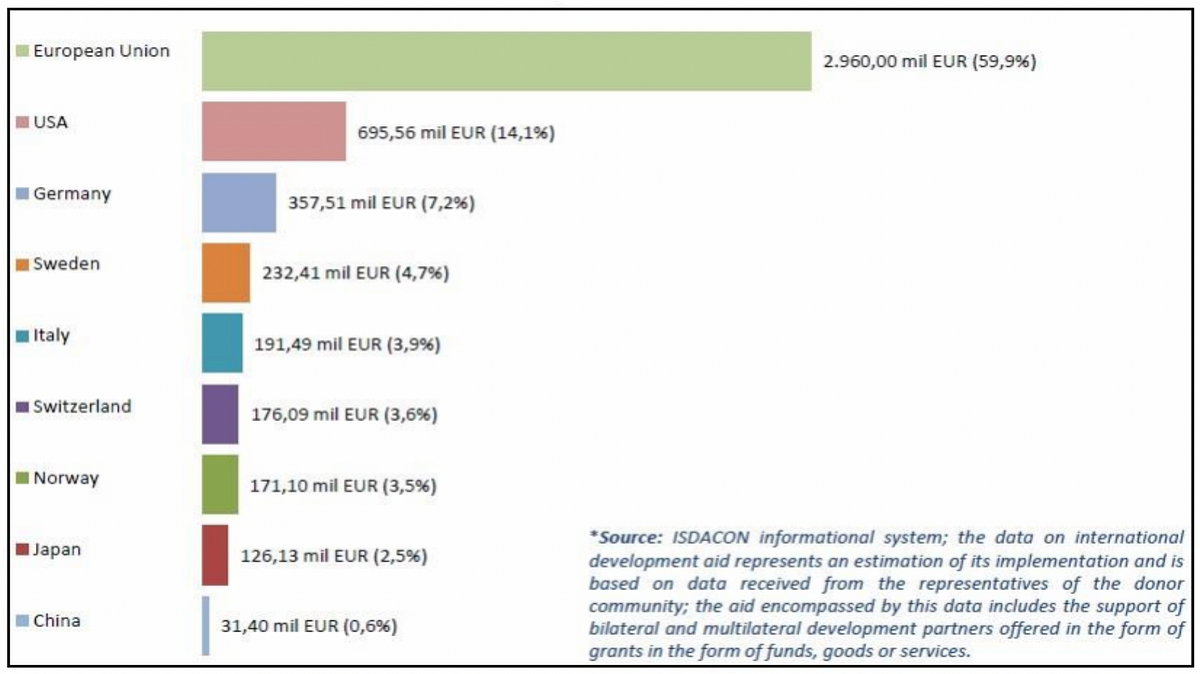
While presenting itself as a responsible and reliable actor amid the COVID-19 crisis, the Kremlin is seeking to undermine the EU’s credibility through a charm offensive combined with false narratives. In Serbia, the mismatch between public perception of international aid to the country and the reality of which actors provide the most support creates fertile ground for Russian disinformation. It also serves as a clear signal that the EU needs to communicate its support to the people of Serbia more effectively if it wishes to reassure Serbians that it is with them in solidarity as the country weathers the pandemic.
Givi Gigitashvili is Research Assistant, Caucasus, with the Digital Forensic Research Lab.
Follow along on Twitter for more in-depth analysis from our #DigitalSherlocks.

